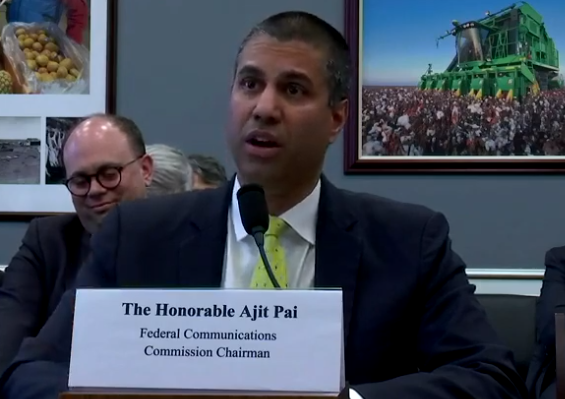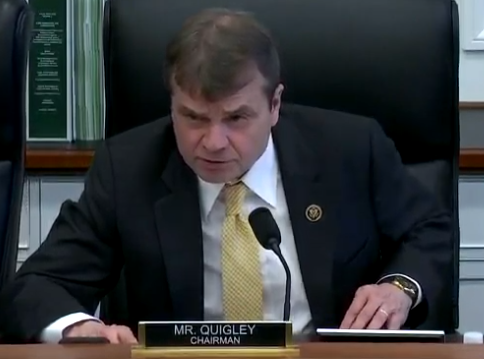Pai to Hill: We Hope to Move Quickly on USF Suspect-Tech Ban
The smarter way to stay on top of the multichannel video marketplace. Sign up below.
You are now subscribed
Your newsletter sign-up was successful
FCC Chairman Ajit Pai says the FCC is quickly trying to wrap up an item banning suspect tech from using government subsidy money for broadband buildouts.
It would apply to any technology considered a cybersecurity risk, but was prompted by concerns over Chinese telecoms Huawai and ZTE. That technology includes everything from phones, tablets and smart watches to mobile hot spots, broadband routers, switchers and servers.
Related: Huawei Says FCC Can't Block USF Funding

Pai was asked about the status of the item at a House Appropriations Financial Services and General Government Subcommittee hearing on the FCC's budget this week.
It has been a year this month since the FCC opened a proceeding on potentially barring Universal Service Fund (USF) subsidy money from being used to buy equipment or services from a company posing a national security threat to a U.S. communications network or supply chain. USF is the government subsidy program for advanced telecommunications to areas that are difficult to reach, either because of geography or economics.
U.S. intelligence agencies have collectively told Congress they are concerned about Chinese tech in U.S. systems due to the companies alleged cozy relationship with the Chinese government, which is the U.S.'s chief competitor in the race to 5G. Huawei president Ren Zhengfei has said his company does not spy or provide technological back doors to its products.

Rep. Mike Quigley (D-Ill.) said it was important to win the race to 5G, but to win it the right way. He said that Chinese telecom equipment issues were troubling and he was concerned about a 5G net being "weaponized and used against the American people."\
The smarter way to stay on top of the multichannel video marketplace. Sign up below.
He asked Pai to explain the status of the item.
He said the FCC has developed a record--from public and stakeholder comment--is working with the National Telecommunications & Information Administration, the White House's chief telecom policy adviser, to finalize the proposal in terms of the agencies who will be determining who and what the threats are. "We hope to move forward quickly," he said, adding that he shared the priority the Congress attached on getting it done.
Related: Huawei Pushes Back Hard at FCC
The FCC proposed applying the prohibition only to future equipment purchases and not requiring carriers to remove equipment from companies identified as a threat, though it asked about such retroactive removal.
According to senior FCC officials speaking on background, the proposal stemmed, in part, from a Dec. 20, 2017, letter from Congress expressing concerns about Chinese companies Huawei and ZTE, plus a follow-up intelligence briefing, both of which were described as impetuses to the effort to monitor the supply chain.
Huawei and ZTE have long been the objects of intense scrutiny in Washington over their alleged ties to the Chinese government. That has manifested itself in a congressionally-imposed ban on their tech in government contracts and more.
The various FCC commissioners have a number of issues with the potential ban, including whether it would disproportionately hurt smaller providers, how a company would be identified as a threat, what tech would be affected, and striking the right balance between protecting security and not making it harder to deploy plant.
In related news, Sen. Marco Rubio (R-Fla.), one of the leading voices for keeping suspect tech out of U.S. nets, praised a report that MIT was cutting off funding and R&D lined to Huawei and ZTE.
“MIT is right to terminate its funding and research links with Chinese state-directed actors Huawei and ZTE,” he said. “China, Chinese state-directed telecommunications, and other state-directed enterprises pose a significant, long-term threat to U.S. economic and national security, and American universities would be wise to wake up to that fact.”
Contributing editor John Eggerton has been an editor and/or writer on media regulation, legislation and policy for over four decades, including covering the FCC, FTC, Congress, the major media trade associations, and the federal courts. In addition to Multichannel News and Broadcasting + Cable, his work has appeared in Radio World, TV Technology, TV Fax, This Week in Consumer Electronics, Variety and the Encyclopedia Britannica.

